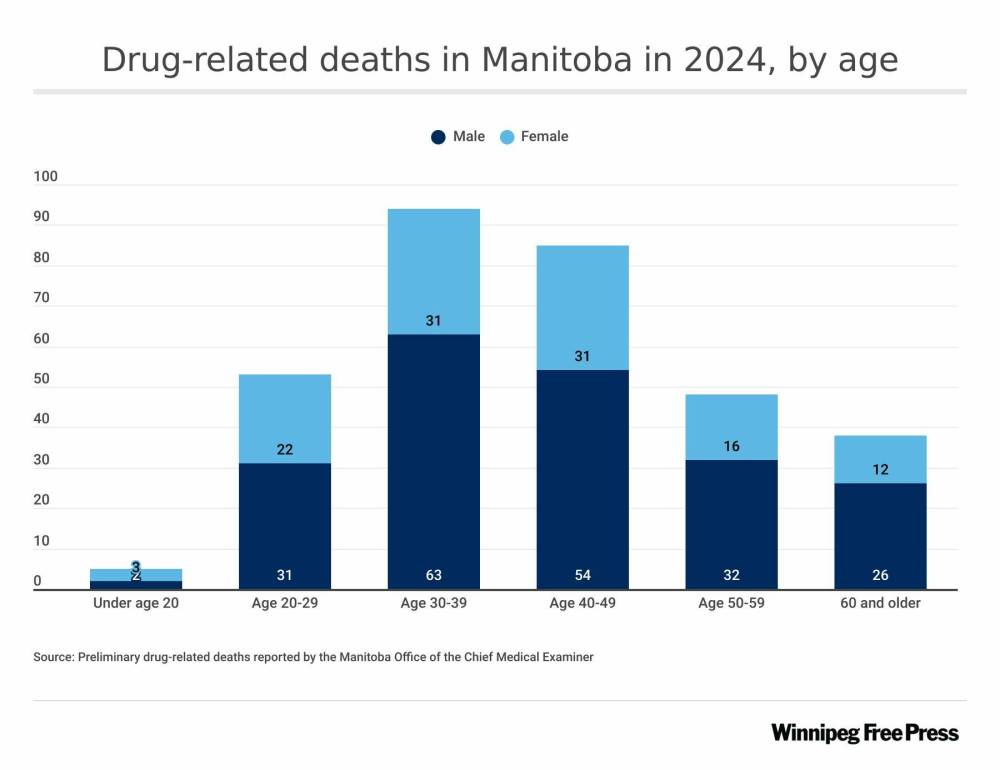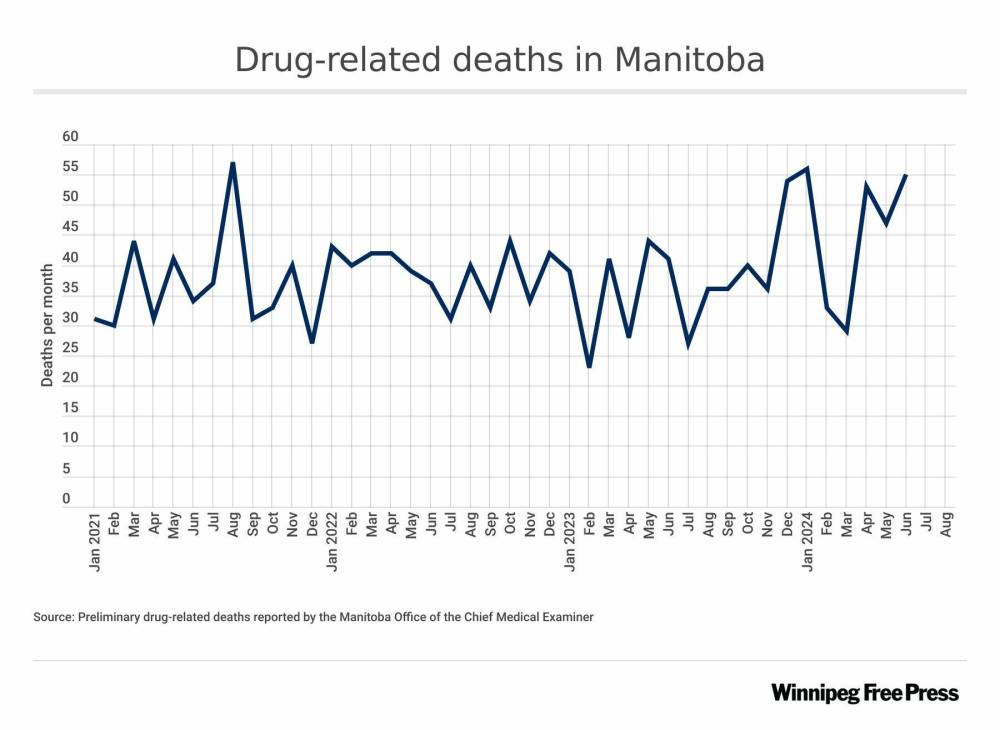The number of suspected drug-related deaths in Manitoba is trending toward an annual record, after 105 people died in June and July, new preliminary data showed on Monday.
Manitoba recorded 323 suspected overdoses or drug poisonings between Jan. 1 and July 31, according to updated unofficial data from the Office of the Chief Medical Examiner.
“That hurts. I think of those families,” said Joseph Fourre, whose 31-year-old son, Harlan, died after taking a drug laced with fentanyl in 2023. “That’s a real reality that we will probably see over 500 deaths (this year).”

The CME reported a record 467 preliminary deaths in 2022 and 445 in 2023. The figures are subject to change when finalized.
The CME reported 55 suspected drug-related deaths in June — one of the highest monthly totals on record — and 50 in July.
Over that period, 33 people who died were in their 40s, while 30 were 30-39 years old. The CME identified 66 as male and 39 as female.
“Of course, one death is too many in our province,” said Housing, Addictions and Homelessness Minister Bernadette Smith. “Any time we see anyone with their life being taken as a result of an overdose, it’s too many. It’s heartbreaking.”
Stephanie Holfeld, the CME’s acting executive director, said 50-60 per cent of cases continue to be fentanyl-related.
“These fentanyl cases also typically involve multiple substances including para-fluorofentanyl, methamphetamine and one or more benzodiazepines,” she wrote in an email.
Non-fentanyl deaths are largely due to stimulants, such as cocaine or meth, Holfeld wrote.
It’s not just people with a drug addiction who are dying, Fourre warned.
He said casual or first-time users are at risk, given the potential for drugs to be secretly laced with fentanyl, a highly potent synthetic opioid, or other toxic substances.
Fourre said his son, who wasn’t an addict, died of drug poisoning after taking a substance he didn’t know was tainted with fentanyl.
“One bad choice can kill you, and there’s no soft way of saying that,” said Fourre, who lives in The Pas. “Social use is not safe use. Fentanyl has changed everything.”
Fourre has been raising awareness about the dangers of drug use since his son’s death. He created the Singing Red Bear Foundation in his son’s memory, and started an awareness campaign called “No Thanks, I’m Good,” which he takes to Manitoba schools.
“This is why we do what we do in the hope that nobody will have to experience that pain,” Fourre said, referring to the CME’s most recent data.
Now in the second year of its four-year term, the NDP government — like the Progressive Conservatives before it — has faced calls to ramp up resources and supports for drug users, and eliminate barriers people face when trying to access care.

The current government has promised a comprehensive approach including treatment beds, sobering centres, supportive housing and enforcement to help tackle Manitoba’s drug crisis.
“We’re looking forward to always bringing out more supports as we see the gaps,” Smith said.
She said 40 per cent of people who visited a first-come, first-served Rapid Access to Addictions Medicine Clinic in 2023 were turned away. The figure has since decreased to 19 per cent, the minister said.
In October, the province announced a virtual RAAM walk-in service.
The NDP has not yet announced a location for an Indigenous-led supervised drug consumption site in Winnipeg.
Smith said more details about the facility, which will have on-site supports, will be revealed in the coming months.
Last week, Manitoba Advocate for Children and Youth Sherry Gott renewed calls for a youth-based addictions strategy. The province has said a youth-focused strategy is coming.
Gott’s office released a report Thursday that said a majority of the 39 people her office interviewed were not aware of the variety of support services available to them.
Many of those who were aware of the available help said they faced long, discouraging wait lists. Some abandoned their search for help or accepted services that had shorter waits but didn’t meet their needs, the report said.
chris.kitching@freepress.mb.ca

Chris Kitching
Reporter
Chris Kitching is a general assignment reporter at the Free Press. He began his newspaper career in 2001, with stops in Winnipeg, Toronto and London, England, along the way. After returning to Winnipeg, he joined the Free Press in 2021, and now covers a little bit of everything for the newspaper. Read more about Chris.
Every piece of reporting Chris produces is reviewed by an editing team before it is posted online or published in print — part of the Free Press‘s tradition, since 1872, of producing reliable independent journalism. Read more about Free Press’s history and mandate, and learn how our newsroom operates.
Our newsroom depends on a growing audience of readers to power our journalism. If you are not a paid reader, please consider becoming a subscriber.
Our newsroom depends on its audience of readers to power our journalism. Thank you for your support.